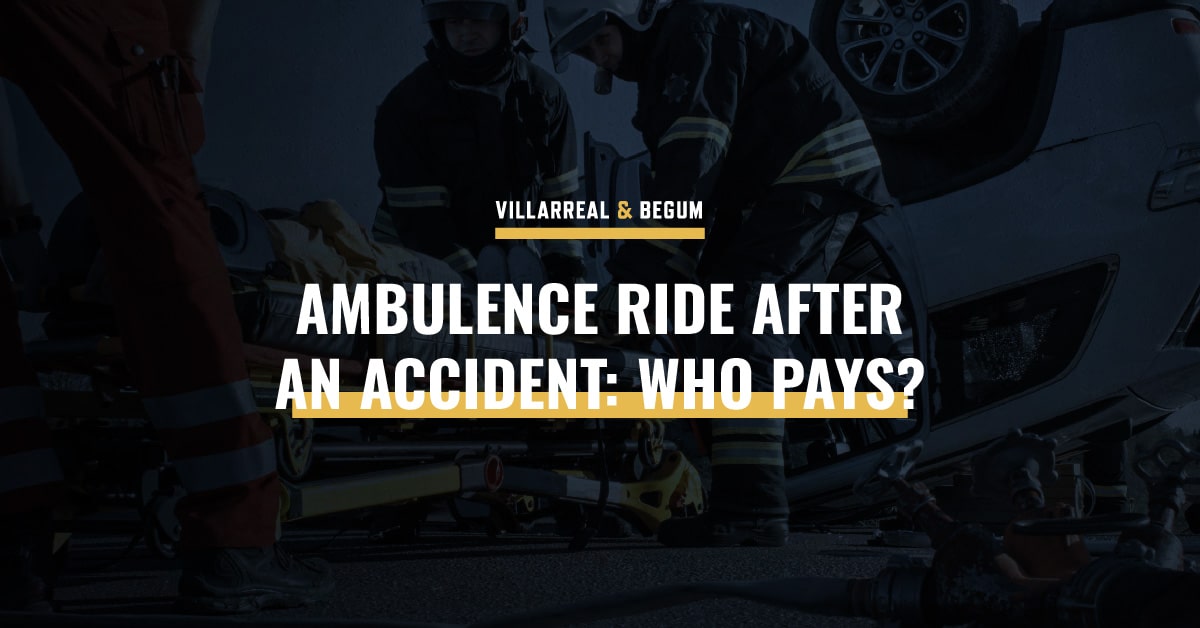When you’ve been injured in a car wreck, the sound of ambulance sirens is extremely reassuring. It means that help is en route and your healing journey is about to begin. However, once you’ve been transported to the nearest hospital and received emergency medical treatment for broken bones and other injuries, a pressing question may arise: who is responsible for paying for the ambulance ride?
When you’re unable to work and facing mounting medical bills, this question is more than a matter of curiosity. In this blog, we clarify the issue of who pays for your ambulance ride and how a Texas car accident lawyer can advocate for you as you seek compensation for all of your accident-related expenses.
How Much Does an Ambulance Ride Cost?
According to a 2020 report from FAIR Health, the average cost of an ambulance ride in the United States ranges from approximately $940 to $1,277. This variation in cost depends largely on the level of care required during transport.
Ambulance services are generally categorized into two main types: Advanced Life Support (ALS) and Basic Life Support (BLS). ALS services involve more complex life-saving procedures and, naturally, tend to be more expensive. BLS services, on the other hand, cover basic medical emergency care and transport. The FAIR Health report highlighted a significant increase in charges for ALS ambulance services, which jumped about 23% from 2017 to 2020.
Another factor influencing the cost is your location, as prices can vary from one region to another. Most ambulance companies also charge a base fee for the service, with an additional fee for the distance traveled to the medical facility. This means the further accident victims are transported, the higher the cost can be. Being informed about these factors and your insurance coverage can help alleviate some of the stress associated with emergency medical transportation.
Understanding Texas Law Regarding Ambulance Services
Ambulance services in Texas are regulated to ensure they meet certain standards for care and operation. As stated previously, billing for these medical services is typically based on the service provided and the distance covered. The rates and billing practices can vary depending on the service provider and the area in Texas. These regulations, however, do not directly dictate who should pay for these services in the event of an accident.
Depending on the circumstances, payment for ambulance services may be covered by these options:
- Your Auto Insurance: In Texas, if you have Personal Injury Protection (PIP) as part of your auto insurance, it can cover ambulance fees regardless of who is at fault. This coverage is designed to pay for medical expenses, including ambulance rides, up to the limit of your policy.
- Your Health Insurance Coverage: If you have health insurance, it may cover ambulance costs, but this depends on the specifics of your policy. Some health insurance policies may only cover a portion of the cost or offer ambulance coverage under certain conditions.
- At-Fault Driver’s Insurance: If another driver is at fault for the accident, their liability insurance may cover your ambulance expenses and medical attention. However, this often requires establishing fault and can be subject to the limits of the at-fault driver’s policy.
In cases where insurance coverage is insufficient or disputes arise regarding payment responsibility, legal advice may be necessary. A Texas car accident attorney can help you address these situations, ensuring that your rights are protected and you are not unfairly burdened with costs.
When Another Party is Responsible for the Accident
If another party is clearly at fault in your car accident, their liability insurance is typically responsible for covering your medical bills, including ambulance costs. It is important to note, however, that Texas follows a modified comparative fault system. If you are found to be less than 51% responsible for the accident, you can seek compensation from the at-fault party’s insurance. However, your compensation may be reduced by your percentage of fault.
To recoup ambulance expenses from the at-fault party, you must file a claim with their insurance company. This involves providing accident information, the police report, and details of the ambulance service. It’s important to be prepared for negotiation: insurance companies are like any other business in that their goal is to preserve profits, and they often try to reduce the amount they have to pay out.
This is where a Texas personal injury lawyer can help. They can explain your rights, ensure your insurance claim is filed correctly and on time, and negotiate a settlement with the insurance provider. If necessary, they can take your case to court and fight for a verdict that covers maximum compensation. While Texas law does not require you to use an attorney for your injury claim, doing so can get better results than if you handled it alone.
What If You’re Injured By a Hit and Run Driver?
If you are injured and the responsible driver flees the scene, the Personal Injury Protection (PIP) on your auto insurance policy can be used to cover the ambulance expenses. PIP is designed to pay for medical care, including ambulance rides, regardless of who is at fault. If you never declined this coverage in writing, you likely have either PIP or Medical Payments Coverage (MedPay), which also covers accident-related medical costs.
In the absence of PIP coverage or if the costs exceed your PIP limits, your health insurance may cover the remaining expenses. However, this is dependent on the specifics of your health insurance plan, and you may be responsible for any deductibles or copayments as outlined in your policy.
If you have uninsured motorist and underinsured motorist insurance (UIM) coverage, it can also provide a safety net in a hit-and-run situation. This coverage is designed to protect you in cases where the at-fault driver is not insured, underinsured, or, as in the case of a hit-and-run, cannot be identified. This coverage can help with hospital expenses, including ambulance costs, up to the limits of your policy.
If you do not have any of these coverages, or if they are insufficient to cover the total costs, you may be personally responsible for the ambulance fees. However, a personal injury attorney can help explore any additional avenues for compensation or negotiate with medical providers to reduce your financial burden.
Is It Possible To Pay Your Ambulance Bill After Your Case Is Settled?
While most ambulance bills are due 30 days after you receive them, your car accident attorney can submit a Letter of Protection to the ambulance provider on your behalf. This letter serves as a formal promise that the ambulance bill will be paid once you receive your settlement. In most cases, the company will be willing to wait for their payment without imposing late fees or escalating the matter to a collections agency.
By engaging a car accident lawyer who can issue a Letter of Protection, you can ease some of the immediate financial pressure. This allows you to focus on your recovery without the added worry of how and when to pay the ambulance bill.
Questions About Your Ambulance Bill? Speak to a Texas Car Accident Lawyer Today
The financial implications of a car accident (which include ambulance bills) can add to the stress of an already difficult situation. Understanding who is responsible for paying for an ambulance ride after an accident and how to handle the financial burden is critical.
If you have been injured in an auto accident, do not hesitate to contact the Villarreal & Begum, LAW GUNS. With us handling your personal injury claim, you can focus on your recovery, confident that the financial aspects of your accident (including the ambulance bill) are being handled competently and efficiently. To schedule your free initial consultation with a car accident attorney, call (210) 800-0000 or contact us online today.

Alex has tried over 50 trials to verdict and tried or settled over five hundred million dollars in cases. Alexander Begum is a founding shareholder of the Villareal & Begum Law Firm. Born and raised in Texas.





